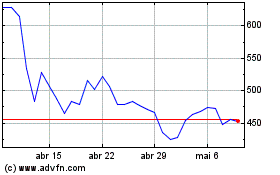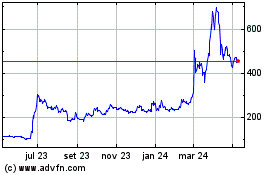Forbes Unveils 20 Crypto ‘Zombies,’ Declares Ripple And XRP Among The Undead
26 Abril 2024 - 11:30PM
NEWSBTC
In a controversial report, Forbes unveiled a list of 20 “crypto
billion-dollar zombies,” Layer 1 (L1) tokens, which the news outlet
defines as crypto assets with substantial valuations but “limited
utility beyond speculative trading.” These cryptocurrencies
and projects include Ripple, XRP, Ethereum Classic (ETC), Tezos
(XTZ), Algorand (ALGO), and Cardano (ADA), among others. XRP
And Ethereum Classic In The Spotlight Ripple Labs, the company
behind XRP, was highlighted as a prominent crypto zombie. Despite
XRP’s active trading volume of around $2 billion daily, Forbes
asserts that the token’s primary purpose remains “speculative” and
“lacking meaningful utility.” Related Reading: XRP Whales Are
Active: Here’s Where They Are Sending Coins However, Ripple Labs
and XRP are not alone in this regard. Forbes reveals that 50
blockchains, excluding Bitcoin (BTC) and Ethereum (ETH), currently
trade at values surpassing $1 billion, with at least 20 of them
classified as “functional zombies.” Collectively, these 20
blockchains hold a market value of $116 billion, despite having
“limited user bases.” According to Forbes, an example of a
“functional zombie” is Ethereum Classic, which maintains the
distinction of being the original Ethereum chain. While ETC
has a market value of $4.6 billion, its fee generation in 2023 was
less than $41,000, raising questions about the blockchain’s
viability for the news organization. Another crypto project in
Forbes’ report is Tezos, which raised $230 million through an
initial coin offering (ICO) in 2017. Tezos’ XTZ token
currently holds a market capitalization of $1.2 billion. However,
the blockchain’s fee earnings were meager, with $5,640 in February
2024 and a total of $177,653 for all of 2023. Algorand, once
hailed as an “Ethereum killer” due to its capability of processing
7,500 transactions per second, faces similar challenges.
Despite a market cap of $2 billion and a treasury holding of $500
million, Algorand earned $63,000 in blockchain transaction fees
throughout 2023. For Forbes, this casts doubt on its actual
adoption and utility. Crypto ‘Zombie’ Blockchains The zombie
blockchains are categorized into two groups by Forbes: spin-offs
and direct competitors to established blockchains like Bitcoin and
Ethereum. Spin-off zombies include Bitcoin Cash (BCH),
Litecoin (LTC), Monero (XMR), Bitcoin SV (BSV), and Ethereum
Classic. These blockchains, collectively valued at $23
billion, reportedly emerged from “disagreements” among programmers
regarding the governance and direction of the original
chains. Forbes notes that when such conflicts arise, hard
forks occur, resulting in new networks that share the same
transaction history as their predecessors. The agency claims that
their market value “often exceeds” their real-world usage. Related
Reading: Ethereum Withdrawals From Exchanges Top 260,000 ETH – What
This Means For Price Overall, The report highlights a growing
disparity between the valuations of certain projects in the
cryptocurrency industry and their actual utility and usage.
Consequently, Forbes refers to these projects as “zombies.”
Featured image from Shutterstock, chart from TradingView.com
Bitcoin Cash (COIN:BCHUSD)
Gráfico Histórico do Ativo
De Abr 2024 até Mai 2024

Bitcoin Cash (COIN:BCHUSD)
Gráfico Histórico do Ativo
De Mai 2023 até Mai 2024
